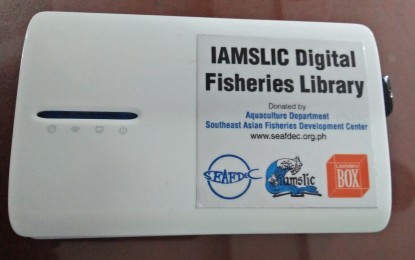
DIGITAL FISHERIES LIBRARY. The Southeast Asian Fisheries Development Center-Aquaculture Department (SEAFDEC-AQD) donates digital fisheries libraries such as the one shown in photo to 14 state universities and colleges in the country as part of the week-long celebration of the center’s 45th founding anniversary. (Photo by Perla G. Lena)
ILOILO CITY – Fourteen state universities and colleges (SUCs) in the country have received free virtual fishery library devices donated by the Southeast Asian Fisheries Development Center-Aquaculture Department (SEAFDEC-AQD), in celebration of its 45th founding anniversary.
The “IAMSLIC (International Association of Aquatic and Marine Science Libraries and Information Center) Digital Fisheries Libraries” contain over 26,000 aquatic and marine science publications, including SEAFDEC publications that can be accessed by users through their laptops or smart phones with Wi-Fi connections.
“The target of the gadget is those off the grid; most of the fishery schools are located (in places) with intermittent internet connection and power. Sometimes they don’t even have internet connection,” said Stephen Alayon, acting head of the library and data banking service section of SEAFDEC based in Barangay Buyuan, Tigbauan, Iloilo in an interview Friday.
He added that to access the library, one just have to switch on the device and students can download the materials into their mobile phones and laptops.
The virtual libraries were distributed to their recipients in a ceremony held at the center on Thursday. The recipient schools included the Aklan State University, New Washington in Aklan; Capiz State University, Dayao in Capiz; Northern Iloilo Polytechnic State College, Concepcion in Iloilo; University of Antique-Tario Lim Memorial Campus, Tibiao in Antique; University of the Philippines, Miagao, Iloilo; Bicol University, Tabaco; Mindanao State University, Naawan; Western Philippine University, Puerto Princesa; Bohol Island State University, Candijay; Samar State University, Mercedes; University of Southern Mindanao, Kabacan; Iloilo State College of Fisheries Maon Campus; Central Luzon State University; and Mariano Marcos State Univeristy.
“We plan to deposit more publications from SEAFDEC since the library staff was able to get a grant to digitize SEAFDEC publications,” Alayon said. The publications will also include those of other departments like the training department in MFRD (Marine Fisheries Research Department) in Malaysia and Singapore, and the IFRDMD (Inland Fishery Resources Development and Management Department) in Indonesia.
The gadget has a capacity of around 128 gigabytes and to date, it contains around 64 gigabytes.
Alayon said that the Philippines is the first country in the whole of Asia to use the gadget. The second one is Vietnam, which has only one unit while the Philippines has 19 virtual fishery library gadgets.
The Philippines obtained its first five gadgets donated by the IAAMSLIC in 2016. They were given to libraries devastated by typhoon Yolanda, including the Visayas State University in Tolosa, Leyte; Northern Iloilo Polytechnic State College, (NIPSC) in Estancia and Cebu Technological University in Daanbantayan, Cebu.
The two others were donated to the Cavite State University (CSU) in Naic, Cavite and Mindanao State University in Marawi.
Alayon believed that the virtual library is useful based on the response of students, when they visited different fishery schools to demonstrate utilization and surveyed around 700 undergraduate fishery students.
In addition to the virtual library, SEAFDEC also distributes print publication to more than 200 fishery schools in the country. Next year, the plan is to provide publications to schools that offer aquaculture NC II program in their Senior High School.
He added that SEAFDEC publications are also available online.
“We advocate open access since we believe that information generated from publicly-funded researches should go back to the public,” he said.
SEAFDEC, as a regional treaty organization, was mandated to promote sustainable fisheries development in Southeast Asia through research, training and information dissemination activities.
Its member-countries are Brunei Darussalam, Cambodia, Indonesia, Japan, Lao PDR, Malaysia, Myanmar, Philippines, Singapore, Thailand and Vietnam. (PNA)
